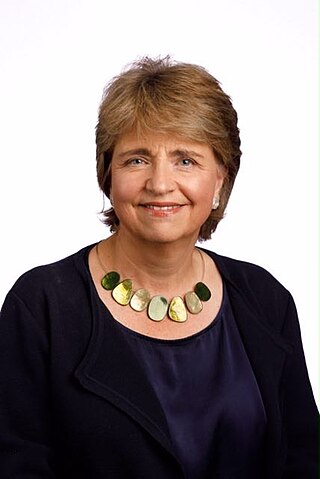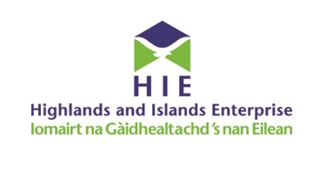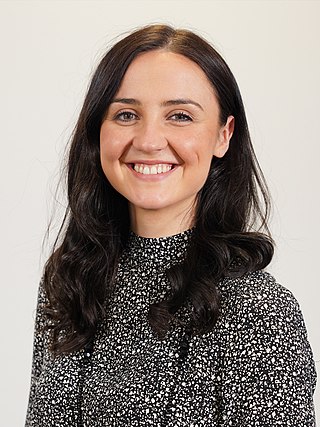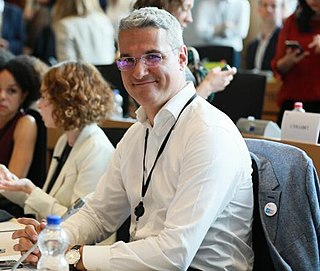
Wendy Alexander is a retired Scottish politician and the former Member of the Scottish Parliament (MSP) for Paisley North. She held various Scottish Government cabinet posts and was the Leader of the Labour Party in Scotland from 2007 to 2008. In 2010–2011 she convened the Scotland Bill Committee on financial powers of the Scottish Parliament.

The Government of Jersey is the executive body of the States of Jersey and is the central government of the Bailiwick of Jersey. The government is led by the Chief Minister, who nominates all the remaining ministers, all elected by the States Assembly.

In the United Kingdom, regional development agencies (RDAs) were nine non-departmental public bodies established for the purpose of development, primarily economic, of England's Government Office regions between 1998 and 2010. There was one RDA for each of the NUTS level 1 regions of England. Similar activities were carried out in Wales by the Welsh Government Department of Economy and Transport, in Northern Ireland by the Department of Enterprise, Trade and Investment and in Scotland by Scottish Enterprise and Highlands and Islands Enterprise.

The Columba Project, formerly known as the Columba Initiative is a program for Gaelic speakers in Scotland and Ireland to meet each other more often, and in so doing to learn more of the language, heritage and lifestyles of one another. It was named after Colm Cille, whose monasteries shaped and spanned the Gaelic world of Ireland and Scotland.
A social enterprise is an organization that applies commercial strategies to maximize improvements in financial, social and environmental well-being. This may include maximizing social impact alongside profits for co-owners.

The Convention of Scottish Local Authorities (COSLA) is the national association of Scottish councils and acts as an employers' association for its 32 member authorities.

Scottish Enterprise is a non-departmental public body of the Scottish Government which encourages economic development, enterprise, innovation, international and investment in business. The body covers the eastern and central parts of Scotland whilst similar bodies, Highlands and Islands Enterprise and South of Scotland Enterprise, operate in north-western and southern Scotland, respectively.

The Enterprise, Transport and Lifelong Learning Department (ETLLD) was a former Scottish Executive department responsible for economic and industrial development, further and higher education, skills, lifelong learning, energy, transport and digital connectivity until 2007.

Highlands and Islands Enterprise is the development agency for the Highlands and Islands of Scotland, an executive non-departmental public body of the Scottish Government with the role to "help build a prosperous, sustainable and inclusive economy across the Highlands and Islands, attracting more people to live, work, study, invest and visit there."
The Scottish Council for Development and Industry (SCDI), founded in 1931, is a non-governmental, membership organisation which aims to strengthen Scotland's economic competitiveness through influencing government to create sustainable economic prosperity for Scotland.

University Alliance (UA) is an association of British universities formed in 2006 as the Alliance of Non-Aligned Universities, adopting its current name in 2007.

The Cabinet Secretary for Wellbeing Economy, Fair Work and Energy, commonly referred to as the Wellbeing Economy Secretary, is a Scottish Government Cabinet position with responsibility for the economy of Scotland. The role in it current form is effectively a recreation of the former position of Cabinet Secretary for Economy, Jobs and Fair Work.
Energy policy in Scotland is a matter that has been specifically reserved to the UK parliament under the terms of the Scotland Act 1998 that created the devolved Scottish Parliament. However, since planning is a matter that has been devolved, the Scottish government has the ability to shape the direction of energy generation in Scotland by approving or refusing new projects.
Chernobyl Recovery and Development Programme (CRDP) is developed by the United Nations Development Programme and aims at ensuring return to normal life as a realistic prospect for people living in regions affected by Chernobyl disaster. The Programme provides continuing support to the Government of Ukraine for elaboration and implementation of development-oriented solutions for the regions. The CRDP, part of the United Nations Development Programme activities in Ukraine, has been launched based on the recommendations of “The Human Consequences of the Chernobyl Nuclear Accident. A strategy for Recovery”Archived 2011-10-04 at the Wayback Machine, the joint report by UN agencies initiated in February 2002. Since 2003 the CRDP is constantly working to mitigate long-term social, economic and environmental consequences of the Chernobyl catastrophe, to create more favorable living conditions and to promote sustainable human development in the Chernobyl-affected regions. In partnerships with international organizations, oblast, rayon and state administrations, village councils, scientific institutions, non-governmental organizations and private business, CRDP supports community organizations and helps them to implement their initiatives on economic, social development and environmental recovery. In addition, the CRDP distributes information about the Chernobyl catastrophe internationally and within Ukraine.

The Leeds City Region, or informally Greater Leeds, is a local enterprise partnership city region located in West Yorkshire, England. Prior to the West Yorkshire devolution deal, the partnership covered parts of South and North Yorkshire. According to the Office for National Statistics, as of 2017 the city region ranked 2nd behind Greater London for both population and GVA in the United Kingdom. It has a population of 2,320,214 million and a GVA of £69.62 billion.
The National Competitiveness Report of Armenia (ACR) is an annual publication of EV Consulting and the Economy and Values Research Center that aims to encourage and foster in-depth dialogue and analysis on improving Armenia's competitiveness.

The Department for Business, Energy, and Industrial Strategy (BEIS) was a ministerial department of the United Kingdom Government, from July 2016 to February 2023.

Climate change education (CCE) is education that aims to address and develop effective responses to climate change. It helps learners understand the causes and consequences of climate change, prepares them to live with the impacts of climate change and empowers learners to take appropriate actions to adopt more sustainable lifestyles. Climate change and climate change education are global challenges that can be anchored in the curriculum in order to provide local learning and widen up mindset shits on how climate change can be mitigated. In such as case CCE is more than climate change literacy but understanding ways of dealing with climate

Dragoș Pîslaru is a Romanian economist and politician of REPER who has been serving as a Member of the European Parliament since 2019. He was previously a member of USR PLUS/USR. He also held the position of Minister of Labor, Family, Social Protection and the Elderly in the government of Prime Minister Dacian Cioloș from 18 April 2016, until 4 January 2017.

HALO Urban Regeneration, known simply as The HALO, is a Scottish business innovation park, urban regeneration and business start-up support company, founded, based and headquartered in Kilmarnock, East Ayrshire, Scotland. The HALO Urban Regeneration was founded by entrepreneur Marie Macklin CBE in 2006 as HALO Urban Regeneration Company Ltd., having announced the project a few years prior to official funding and creation of the HALO Kilmarnock.















